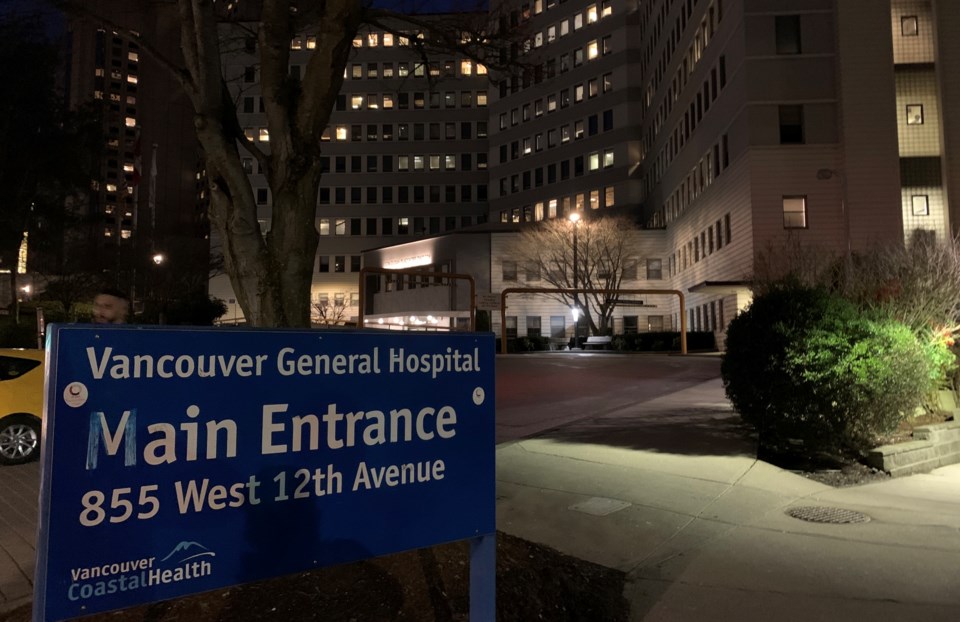The number of active COVID-19 infections in B.C. has risen for the 17th consecutive time in a government data update, to 5,580 – the highest tally since May 13.
The rise in cases makes clear that the pandemic is far from over in the province, and that the risk of rising numbers of people in hospitals, and intensive care units, remains.
The 107 individuals in B.C. hospitals with COVID-19 is four fewer than yesterday, according to data the government released August 18. Of those 53 are sick enough to need attention in intensive care units (ICUs). Those wards have not been as filled with COVID-19 patients since June 8.
One more death from the disease has pushed the province's pandemic death toll to 1,782.
New infections remain elevated, with 553 cases detected in the past 24 hours. That's the second-highest total in a day since May 13.
Of the 7,125 new cases between July 30 and August 17, however, it is clear that there is a trend of younger British Columbians getting infected. Nearly one-third of those cases (32.7%) were in people aged between 20 and 29 years, while 85% of the cases were in individuals who were younger than 50 years.
The B.C. government has never provided immediate breakdowns of how many new infections are in people who are unvaccinated. Instead, it provides this data weeks later.
The trend earlier this summer was clear that it is the unvaccinated who have been fueling new infections, and hospitalizations.
The government's most recent breakdown of infections by vaccination status included cases detected between June 24 and July 24. That data show that of the 1,683 cases detected in that time frame, 1,073, or 63.8%, were in people who were either unvaccinated, or who had had their first vaccine dose within three weeks of first exhibiting symptoms.
Another 511 people, or 30.4%, had either received one dose of vaccine, or had not yet gone one week after having received a second dose. Only 99 cases, or 5.9% of those infections, were in people who had received two doses of vaccine and gone one week after that needed second dose before symptoms first started.
Within the June 24 through July 24 timeframe, only 7.4%, or 10 of 136 people in hospital with COVID-19, had been fully vaccinated for more than seven days when symptoms first appeared. One of the 18 deaths in that time period, or 5.6%, were in people who had been fully vaccinated for more than seven days before symptoms first appeared.
The percentage of all new infections, hospitalizations and deaths that are in fully vaccinated people has been growing, however, as a greater percentage of the overall population becomes fully vaccinated.
More than 95.2%, or 150,102, of the 157,567 people known to have contracted COVID-19 in B.C. are considered by the province to have recovered because they have gone 10 days after first feeling symptoms, and are therefore not thought to be infectious.
Provincial health officer Bonnie Henry told Glacier Media earlier this summer that the province does not wait a full 14-day incubation period before considering someone to have recovered from COVID-19. Many people who have had COVID-19 have reported some long-term effects from the disease, such as difficulty breathing, tiredness and a cough, even though the government considers that they have recovered. They call this condition being a COVID-19 long hauler.
B.C.'s vaccination campaign has fallen off dramatically thanks to the vast majority of British Columbians already being vaccinated.
Officials only provided 17,254 doses of vaccine in the past 24 hours, with that being the second-fewest COVID-19 vaccine doses provided in a day since March 16. Of the new doses to British Columbians, 3,968 went to new people, and 13,286 were needed second doses.
Of the 3,837,946 B.C. residents who have received at least one dose of vaccine, 89.1%, or 3,419,832 are fully vaccinated.
The B.C. government estimated in February that the province's total population is 5,147,712, so that means that nearly 74.6% of B.C.'s total population has had at least one dose of vaccine, and more than 66.4% of the province's total population has had two doses.
The government's math holds that 82.8% of the province's eligible population, aged 12 years and older, has been vaccinated at least once, with 73.8% of eligible people being fully vaccinated.
There are now 11 outbreaks at seniors' living facilities, including one new outbreak, at Nicola Meadows in Merritt.
The other 10 active outbreaks at seniors' homes include:
• Village at Mill Creek (second floor) in Kelowna;
• Hawthorn Park in Kelowna;
• David Lloyd Jones long-term care home in Kelowna;
• Evergreen Baptist Care Society in White Rock;
• KinVillage West Court in South Delta;
• Discovery Harbour in Campbell River;
• Kootenay Street Village in Cranbrook;
• Cottonwoods Care Centre in Kelowna;
• Brookhaven Care Centre in West Kelowna; and
• Nelson Jubilee Manor in Nelson.
Here is a breakdown of where the 553 new COVID-19 infections are in B.C.:
• 152 in Fraser Health (27.5%);
• 97 in Vancouver Coastal Health (17.5%);
• 230 in Interior Health (41.6%);
• 36 in Northern Health (6.5%); and
• 38 in Island Health (6.9%);
The 5,580 active infections, include:
• 990 in Fraser Health (17.8%);
• 811 in Vancouver Coastal Health (14.5%);
• 3,203 in Interior Health (57.4%);
• 230 in Northern Health (4.1%);
• 337 in Island Health (6%); and
• nine people who normally reside outside B.C.



